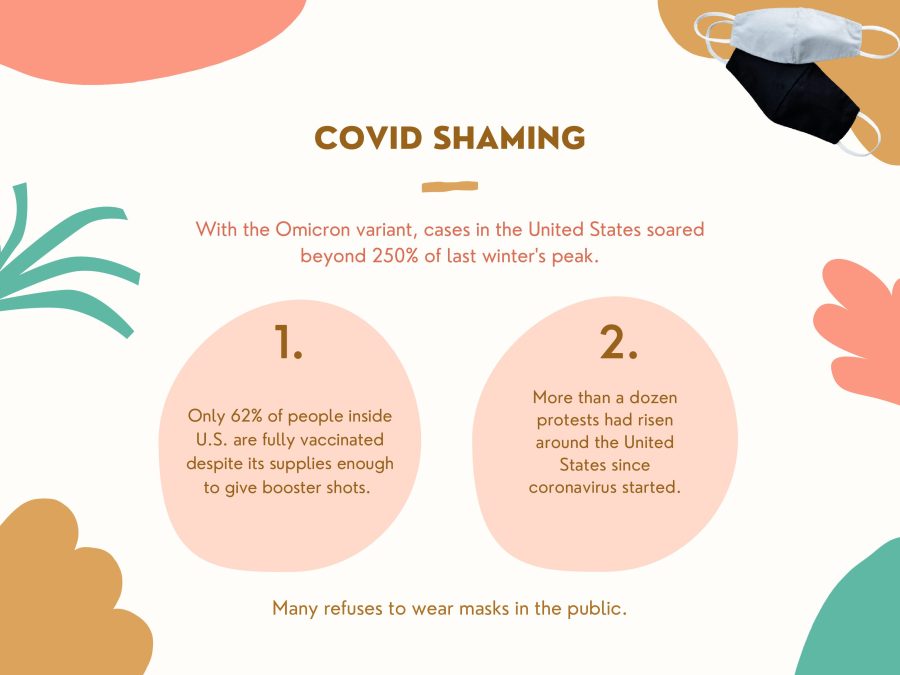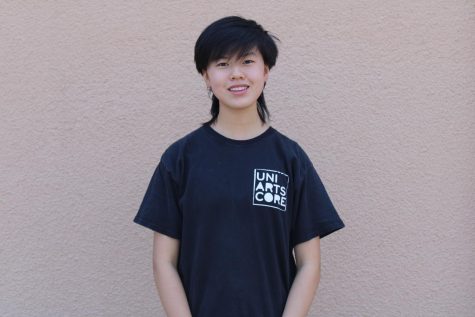A War on COVID Shaming
January 28, 2022
*The opinions expressed within the content are solely the author’s and do not reflect the opinions and beliefs of the website or its affiliates.*
Our world is now a battleground. Conflicts rage between the non-maskers and the maskers, the unvaccinated and the vaccinated. Riots circle cities as health regulations increase. Property has been destroyed and people have been injured. However, hidden amidst it all, the most traversal form of COVID-19, the Omicron variant, has emerged. With the arrival of this new mutation, we have begun to further fragment our communities by shaming those who have caught the virus. We have used COVID-shaming to blame our sick for not masking, for not distancing, for being careless.
Yet, at the center of it all, the actual war should be between humankind and one of the most significant health threats of the 21st century, COVID-19. So, why are we now focused on peripheral issues that divide us? Why do we revoke our compassion for the sick when now is the moment that we need sympathy the most? COVID-shaming has further separated our communities at a time when we can least afford to be divided.
Despite our efforts to purify public spaces through wiping, masking and distancing, it is still unnervingly common to be infected with COVID-19. This is made especially true with the rise of its latest variant, Omnicron, a strain that is nearly four times more infectious than its Delta predecessor, which itself was twice as transmissible as the original virus. This, in part, uproots the reasoning behind COVID-shaming, as it is often out of the control of a person whether or not they contract the virus. A person can do everything “right”—wearing a mask, washing their hands at school, getting vaccinated—but still succumb to COVID-19. The volume of cases is at the highest it has ever been, over one million cases a day, and exposure is difficult, if not impossible, to control. This unmanageability is especially prominent in school, where students are constantly roaming between activities, friends and classes. Without intending to, students and teachers may often be unwittingly exposed to COVID-19. In a situation where the risk of infection is unpredictable and sometimes unavoidable, it is rash to blame those infected for having been exposed automatically.
With other illnesses, we rarely blame individuals for being sick. It is not the student’s fault if they are sick with the cold or the flu. Yet, this line of reasoning does not seem to extend itself to COVID-19. We often think that the infected were not careful enough—they did not get vaccinated, traveled and did not social distance.
Yet, COVID-19 is most obviously different from our common diseases, like the cold. It has shut down or slowed global operations for over a year and still keeps us from escaping this virus-ridden war. No cold has ever done that, and though we might not blame people for contracting the cold, the circumstances may be different for COVID-19. People often encounter abundant warnings and regulations, calls to get vaccinated or boosted and room for personal choice to influence one’s own safety that may prevent contraction and it might seem reasonable to blame those who have disregarded these precautions and been infected. However, current COVID-shaming is no longer just disapproval from others. Instead, this shaming is making individuals feel isolated and anxious. As Sheehan Fisher, a psychologist and assistant professor of psychiatry and behavioral sciences at Northwestern University Feinberg School of Medicine, notes her patients with COVID-19 experience “shame and this shame make them want to avoid social interaction over the phone or even getting social support from friends because they don’t want to be judged.” Dr. Crystal Clark, a fellow psychiatrist and associate professor at Feinberg, adds that others feel like “they are wearing a scarlet letter” for even coughing or sniffling. What we have created through trying to prevent infection is a culture that looks down upon those with COVID-19 and places social pressure on individuals who exhibit even the slightest symptoms. As a result, many people feel overwhelmed with guilt and stress for contracting the disease or more than uneasiness regarding small suspicions. Whatever blame or resentment we might carry for those who have contracted COVID-19, they are still a part of our communities and need our support, not our anger.
However, stopping COVID-shaming does not mean stopping precautions. While we must still support those infected, we cannot forget that we are still at war with a deadly, fast-spreading disease. It is still imperative to social distance, maintain good hygiene and get vaccinated. We must remember to be kind to our neighbors who have contracted COVID-19 and not to feel resentment towards or to blame the individuals who are unlucky enough to be sick. Instead, we have to shift our attention to what truly matters and what is entirely within our control during these trying times.
This pandemic is not a war between the infected and the uninfected, but a fight of humanity against COVID-19. Regardless of our differences, we need to recognize that everyone is fighting the same dangerous battle, risking exposure at work and school and enduring significant impediments to go about daily life. We have neither the time nor resources to divide ourselves when countries struggle to get vaccines and hospitals are bursting with patients. Even amongst the UHS community, we must be kind and understanding of our sick peers and teachers if we intend on being victorious at the end of this long COVID-19 siege.





